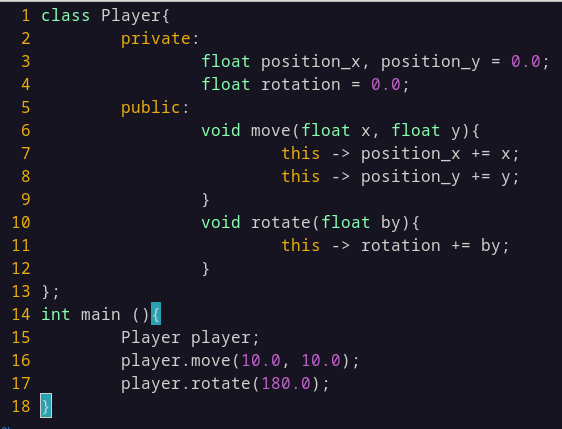I lived in a perfect OOP bubble for my entire life. Everything was peaceful and it worked perfectly. When I wanted to move that player, I do player.move(10.0, 0.0); When I want to collect a coin, I go GameMan -> collect_coin(); And when I really need a global method, so be it. I love my C++, I love my python and yes, I also love my GDScript (Godot Game Engine). They all work with classes and objects and it all works perfectly for me.
But oh no! I wanted to learn Rust recently and I really liked how values are non-mutable by defualt and such, but it doesn't have classes!? What's going on? How do you even move a player? Do you just HAVE to have a global method for everything? like
move_player();
rotate_player();
player_collect_coin();
But no! Even worse! How do you even know which player is meant? Do you just HAVE to pass the player (which is a struct probably) like this?
move(player);
rotate(player);
collect_coin(player, coin);
I do not want to live in a world where everything has to be global! I want my data to be organized and to be able to call my methods WHERE I need them, not where they just lie there, waiting to be used in the global scope.
So please, dear C, Rust and... other non OOP language users! Tell me, what makes you stay with these languages? And what is that coding style even called? Is that the "pure functional style" I heard about some time?
Also what text editor do you use (non judgemental)? Vim user here

There's still quite a few software written in C that does exactly as I did though. Look at OpenSSL's EVP library. I'm not sure about what you mean by "OOP but worse", wouldn't everything be worse than OOP since C isn't an OOP language? Anyways. As I said, what I did is way more common than it seems at least in C, so I get your point but still I can't seem to be able to see what's inherently wrong with it. I would appreciate if you shared any better ideas you might have, though!
Oh, absolutely.
I meant specifically this pattern you showed; it's object-oriented programming but in a language that does nothing to support it.
Rust isn't an OO language either but it adds some sensible abstractions to make OOP-like programming possible in an immediately recognisable and standardised manner.
My primary problem is that it's convention rather than rule.
Just don't use C if you can avoid it ;)
I agree, and thus I think it's safe to assume we also hate the lack of encapsulation in Python despite technically being an OOP language.
I'm fine with C, and if I stop coding in C I would starve since my job depends on it, still thanks for the suggestion though! ;)